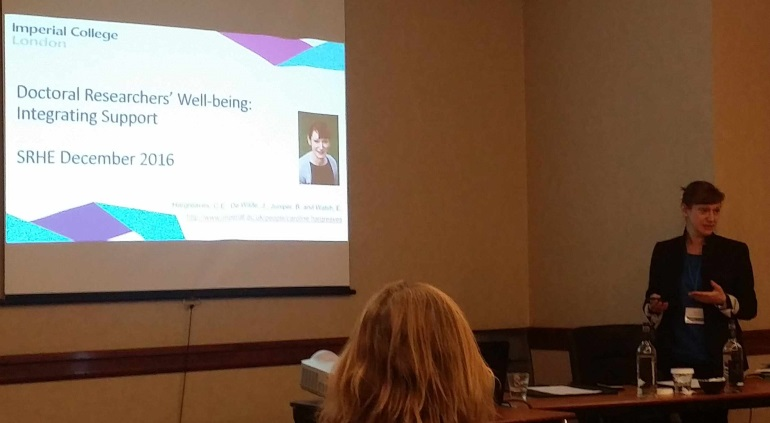By Caroline Hargreaves, Senior Teaching Fellow, Graduate School, Imperial College London.
With the holiday now a memory, the Graduate School looks ahead to a new year of expanding and novel provision for all postgraduates. I wanted to pass on some recent findings about researcher well-being and reasons behind some of the developments, to help you with your choices.
This year I’ve had the good fortune to talk at the Higher Education Academy Surveys Conference and the Society for Research into Higher Education (SRHE) Annual Conference about changes to Well-being in researchers between our 2009 and 2014 studies. A doctoral researcher at my talk at the SRHE mentioned how well our questions reflect doctoral concerns. I’ve also been in collaboration with authors, writing up a paper on our work.

Interest in well-being is increasing nationally and internationally, along with the realisation that reduced well-being can impact people physically and mentally, as well as organisations through altered work schedules. Well-being is used by international organisations such as the OECD (OECD 2016) and smaller organisations as a key indicator for policy formation and development.
As part of the worldwide research community your work will have many impacts from social to economic, so your well-being is important to us as not only as individuals but also on an international level as part of the knowledge and innovation led economy. In 2009, the Graduate School carried out the first well-being study of PhD/MDRes/EngD researchers using Impact Analysis, a clinically approved methodology. We repeated it in 2014 to identify any changes. With support from academic departments and the Graduate Students Union and Students Union we achieved ~45% and 40% response rates in 2009 and 2014 respectively.
While well-being scores overall at Imperial continue to be satisfactory, well-being scores were worse compared to the 2009 study; well-being was found to be lower for women and for late stage doctoral researchers. Since the 2014 findings the Graduate School have been working with students, academics and support staff to see what changes we could make to work to make your experience more positive. I list some of these here:
- The Cohort Building Programme was introduced so that you can gain our support and funding for activities that interest you and help your department and College build your Research Community
- The World Class Research Supervision research and Task and Finish Groups have been informing and adapting provision on a College-wide basis
- The Doctoral Student Coaching Programme introduced 1-1 support opportunities
- The Writing Room and new Writing Retreats are for later stage researchers
- New webinars enable all including those with external commitments to access our provision from home/work (there is also one on well-being devised for PhD Reps to help with their work)
Sign up to our provision follow the links or contact us at the Graduate School with any queries: http://www.imperial.ac.uk/study/pg/graduate-school/professional-skills/doctoral/ and for Master’s http://www.imperial.ac.uk/study/pg/graduate-school/professional-skills/masters/
e-mail: graduate.school@imperial.ac.uk
Follow the link on Graduate School Research including the 2012 study well-being reports for Staff and Students (2016 presentations will be uploaded later in the year): http://www.imperial.ac.uk/study/pg/graduate-school/about-us/student-experience/
Key College and Union contacts for well-being (list under “Here for you”): http://www.imperial.ac.uk/student-space/
If you have any questions regarding well-being or further suggestions for how we might improve wellbeing contact: caroline.hargreaves@imperial.ac.uk